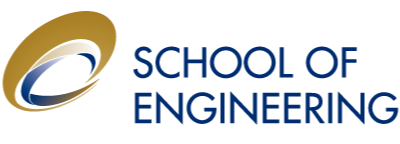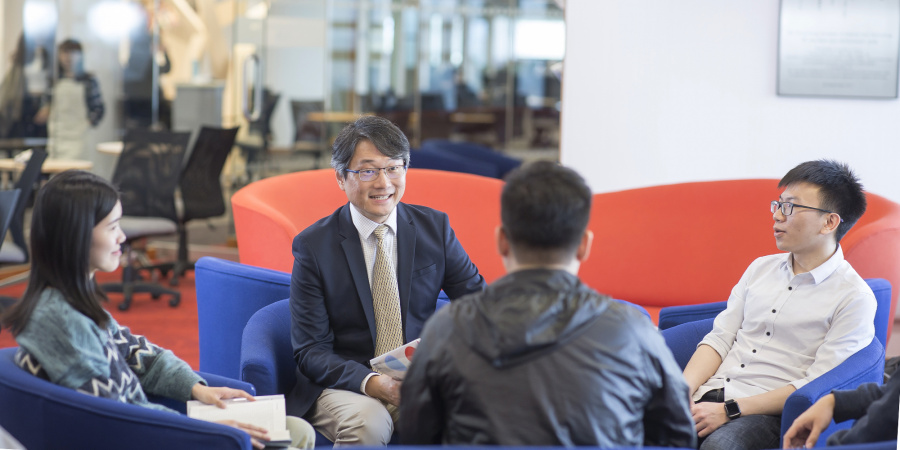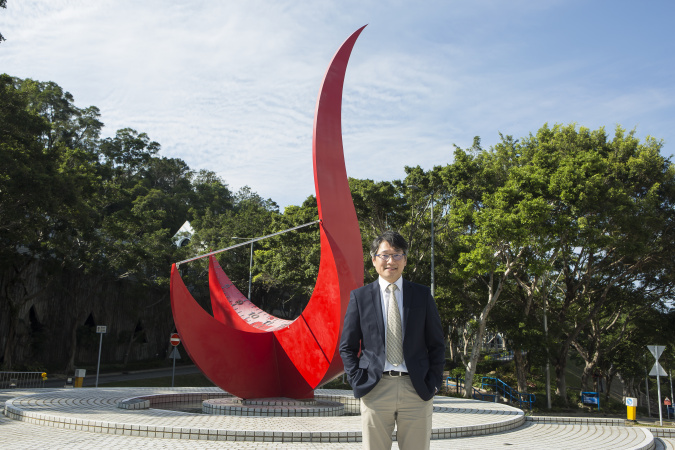Prof. Albert CHUNG Outlines Plan as New Associate Dean of Engineering (Undergraduate Studies)
As an academic, Prof. Albert Chung – Professor in the Departments of Computer Science & Engineering (CSE) and Chemical & Biological Engineering (CBE) – specializes in medical image analysis, a fast-developing technology in the field of healthcare. He was appointed Associate Dean of Engineering (Undergraduate Studies) at the beginning of 2020.
As an administrator, Prof. Chung draws on his years of experience interacting with university students to create the best possible experience for HKUST engineering students – not just in the classroom, but outside as well.
Medical image analysis helps doctors look inside the patient’s body to plan and execute the best cure.
Meanwhile, mind profile analysis is looking into the mind of the students, understanding their life and aspirations, and providing them with the best education possible. This is exactly the work of the Associate Dean of Engineering (Undergraduate Studies).
Exemplary student
Prof. Chung was not the bookworm type of student. Entering the University of Hong Kong in 1991 as a computer engineering student, he resided in Swire Hall and soon became the captain of their swimming team, and later even became Chairman of the hall’s students’ association for a year.
During his residence in Swire Hall, one highly significant event was Prof. WOO Chia-Wei, Founding President of the Hong Kong University of Science and Technology (HKUST), came to the hall to give a high table talk. President Woo outlined what Swire Hall could do to further enhance the student experience.
Upon graduation, Prof. Chung joined Procter & Gamble from 1995 to 1996, and he was attracted back to academia, which gave him more freedom to work on his interested topics. He continued his studies at HKUST, a new university back then, pursuing his MPhil in Computer Science and finishing in 1998.
As a result of his exceptional academic promise, he was awarded a scholarship by the Croucher Foundation to carry out doctoral research at a top university in the world. He picked Oxford.
“Oxford and HKUST are very different. At HKUST, courses are very structured, especially in those days. Engineering is categorized into civil engineering, mechanical engineering, computer engineering, and so on,” Prof. Chung said.
“At Oxford, while the buildings were very antique, the mindset of the people was not. Great importance was attached to human interaction and interdisciplinary collaboration. There was no specific course requirement. Each student is assigned an advisor, and the meetings with the advisor – a very important component for an Oxford education – could last hours,” he said.
Prof. Chung added that at HKUST Engineering, the boundaries between different disciplines are becoming more and more fluid. For instance, the former Civil Engineering Department is now Civil and Environmental Engineering, and Mechanical Engineering is now Mechanical and Aerospace Engineering. Meanwhile, Industrial Engineering has incorporated decision analytics into the program. The scopes have become broader and broader.
“Engineering must work hand in hand with other disciplines. For instance, an engineer can build a bridge, but in choosing the location, other considerations must be taken into account,” he said.
In 2001, Prof. Chung signed a contract with HKUST under which he spent half a year of leave at the Massachusetts Institute of Technology. The following year Prof. Chung, as an assistant professor, started teaching at HKUST. He became a full professor in 2014.
Medical image analysis – cutting-edge technology
Prof Chung’s expertise is in medical image analysis. “Medical image analysis is a broad field. First you produce the images, then store them. How to select the relevant images for the doctor and patient is where the skill is,” Prof. Chung said. “Medical image analysis can display 3D images of say muscles, and identify irregularities.
“I focus on scanning brains – with their white matter, grey matter, and blood vessels.
“In particular, I specialize in the reconstruction of brain blood vessels – a very complicated network. While I don’t need to be a brain specialist, I need at least to learn to speak in a language that doctors understand, and also to understand what the doctors are saying.
“There are lots of software for reconstructing images of blood vessels. Computers are a virtual world. In medical image analysis, you can take out all the tissues, leaving the blood vessels there, and easily see where there is a problem.
“The mega trend is to produce 3D images, and the doctor has to look at a lot of images. The computer can help select the images, but it has to be taught first. For instance, if you have a clear picture of the blood vessels in a retina, you can diagnose more easily,” Prof. Chung said.
Exploring the minds of students
Prof. Chung is by no means an ivory-tower scholar. He spends as much time with students as with books.
“I like talking to people. At HKUST, I had been Residence Master, or Warden, for a total of 13 years – half of the time in Hall 3, and half in Hall 8,” he mused.
“I really enjoyed being a warden. I used to meet with residents four nights per week, including organizing dinners with students every Tuesday, Wednesday and Thursday of the week.
“Now in my new role, I will not be meeting with students at night like what I did as warden. However, I will still organize regular meetings with them - not just current students, but new students.
“I even devote much effort to talking to potential students – in Hong Kong and abroad. We don’t just wait for students to come to the Engineering School – we reach out overseas to identify the brightest minds and encourage them to study at HKUST.
“Our recruitment trips bring us to places like Kuala Lumpur, Jakarta, and major Chinese cities – Beijing, Shanghai and Guangzhou. We first contact the best schools in the city concerned. These schools will recommend suitable students to attend our recruitment talks. The parents are usually there too.”
Indeed, the HKUST School of Engineering is very global, with student coming from 33 nationalities. “Such a diverse and multicultural environment provides a favorable ground for our students, who have passion for different fields of engineering, to work together and explore ideas. The time as an undergraduate student is short but full of possibilities, I hope our students will make good use of these valuable years to enrich themselves and gain rewarding experience.
“A broad outlook is essential to our students – not only are they exposed to fellow students from all over the world, but also a range of disciplines other than their own – including other branches of engineering and also outside engineering. This will make our students more competitive on the job market after they graduate.
As for his motto, Prof. Chung said, “Know your direction and walk towards it bit by bit every day. Do not worry too much about tomorrow and focus on doing your job well today.” He believes that the School’s training provides a very solid ground for students to progress towards their goals.
Related Link
- SENG news (Jan 1, 2020): Prof. Albert CHUNG Appointed Associate Dean of Engineering (Undergraduate Studies)



